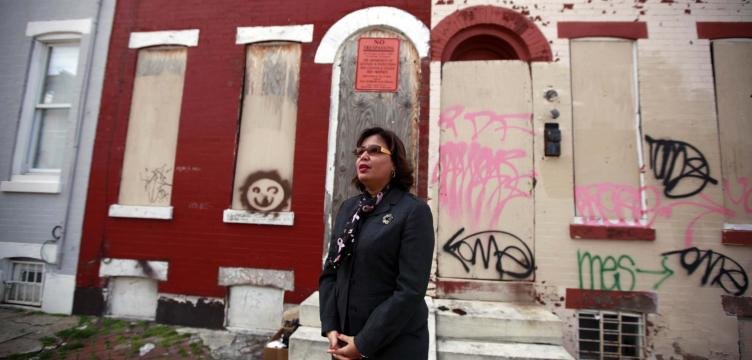
This article was originally posted on planphilly.com
On City Council’s first week back in session, Councilmember Maria Quiñones-Sanchez introduced a bill to bring additional oversight and transparency to the Philadelphia Land Bank, an agency that sells city-owned land.
The bill, introduced at a council meeting on Thursday, comes in the wake of revelations that the city sold lots to politically connected buyers at below-market rates, cheating taxpayers out of revenue that could have gone to support city services. Under the current system, elected Council representatives play a direct role in advancing sales, creating openings for nepotism and corruption.
Quiñones-Sanchez’s bill tries to make the land bank more transparent without altering Council’s involvement. It also attempts to improve the accountability of the process. Under the current law, the land bank monitors compliance with conditions of a sale, but there are no consequences if a purchaser doesn’t maintain or develop the property as promised when the sale was approved.
Under Quiñones-Sanchez’s bill, every sale would include a deed restriction and property title would automatically revert to the land bank if a buyer flipped a lot or otherwise failed to follow through on the conditions listed in the deed restriction. If a buyer wanted to sell a lot purchased from the bank, he or she would have to go back to the agency for permission.
The bill would also require that the land bank respond to applications for publicly held lots under its control within 180 days, speeding up a process that has been criticized as slow and inefficient.
Another provision would exempt land bank holdings from real estate taxes and utility fees, with the exception of the payments owed to the School District of Philadelphia.
Quiñones-Sanchez’s bill is just one of several reform efforts. For the time being, the city has put a freeze on most public land sales until new regulations are put in place.
Quiñones-Sanchez, who helped create the land bank in 2013, opposes the freeze on sales and suggestions that Council should play a reduced role in public land sales.
“It’s the issue of checks and balances,” said Quiñones-Sanchez. “People vote for City Council to have certain authorities, land use being one. That should not be up for debate. Why would anyone give the executive the entire ability to accept applications, process, and apprise and do settlements?”
Of the over 20 land banks in Pennsylvania, only Philadelphia and Pittsburgh include legislative oversight of sales and other transactions. Critics say that this kind of granular political oversight promotes the parochial interests of City Councilmembers over any kind of larger strategic vision for the two cities and their land sale policies.
When Quiñones-Sanchez crafted the land bank legislation at the beginning of the decade, numerous articles pointed out that heavy-handed interference by local legislators had hindered similar institutions in cities like Baltimore and St. Louis.
“Because City Council has a role in literally every single land bank sale and transaction, we are not able to focus on a bigger plan for the whole city,” said Brandy Bones, vice-president and treasurer of the Bella Vista Neighbors Association. “If we are just making these one-off decisions property-by-property, then we don’t know where we are headed or what goals we are trying to achieve.”
One of the city’s principal affordable housing groups, The Philadelphia Coalition for Affordable Communities, emerged last year as a critic of Council involvement in land sales as well. Although councilmembers often defend their prerogative over land use as a means to ensure affordable housing development, the coalition notes that only nine units of affordable housing have been developed on land bank holdings since its creation in 2013.
“Despite these new proposed changes, the Philadelphia Coalition for Affordable Communities remains concerned about where land will go, what type of development will happen and Council’s influence on these land sales,” wrote Thomas H. Earle, CEO of Liberty Resources, in an email message. “We need to ensure that accessible affordable housing does not lose out to campaign contributors.”
But for Quiñones-Sanchez, and her ally City Council President Darrell Clarke, the idea of turning over the land sales process to the city’s bureaucracy is unacceptable. District councilmembers are closer to the public, they argue, and more responsive to constituent concerns than the mayoral administration and the municipal agencies it oversees.
“Where is the check and balance between the legislator and the executive?” asked Quiñones-Sanchez.
